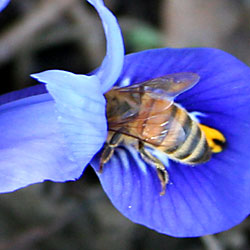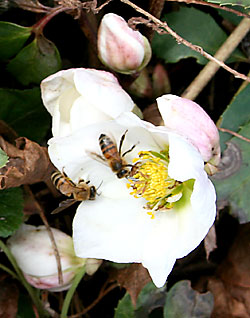 Intriguing article in today’s Washington Post, Honey, I’m Gone: Abandoned Beehives Are a Scientific Mystery and a Metaphor for Our Tenuous Times.
Intriguing article in today’s Washington Post, Honey, I’m Gone: Abandoned Beehives Are a Scientific Mystery and a Metaphor for Our Tenuous Times.
This post’s title references a quote that is also the lede of the article, recalling how in the sci-fi novel “The Hitchhiker’s Guide to the Galaxy,” the dolphins all disappear just before Earth is destroyed to make way for a hyperspatial express route, leaving behind only that message.
Though I’m not sure I buy it (or a lot of what comes out of WaPo these days), the premise of the article is that how we view Colony Collapse Disorder says more about us than about what’s causing the alarming decline of the bees:
If what you’re searching for is an entire spectrum of moral lessons regarding the evils of human behavior, this crisis is even better than global warming. If you hate globalization, then you will doubtless see its evils as patent in the disappearance of the bees. Pesticides? Genetically modified foods? Those, too, are convenient hypotheses in the absence of contradictory information. Even cellphones have been offered as an explanation. If you’re driven crazy by them, then so must be the bees. Isn’t it obvious?
Our fuzzy, hard-working, sweetness-producing icons have become our most powerful Rorschach test.
As go the bees, so go our hopes and fears for the future.
As for the realities of the problem, there’s not much new here. A USDA scientist jokes about bees making crop circles and tells us all the things that apparently aren’t to blame. I take some solace in the notion that the problem seems concentrated on those stressed colonies being shipped all over kingdom come on flatbed trailers, the nation’s ‘hardest working migrants’.
It’s a longish article, but worth a read — or at least skip ahead to the end where the author suggests we take solace in seven of our culture’s great exit lines.
I’m going with the (sarcastic) one from the end of Butch Cassidy and the Sundance Kid:
Good. For a moment there, I thought we were in trouble.


 Colony collapse disorder (CCD) continues to get ink all over. This morning, there was a
Colony collapse disorder (CCD) continues to get ink all over. This morning, there was a